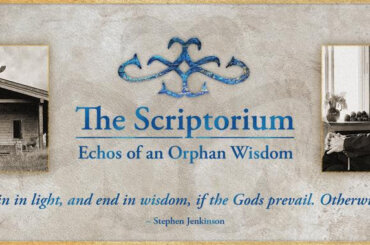One of the things that seemed to concern my mother during her parenting years was the danger of rearing children who turned out ‘bold’. That was the darkening term, as I recall. ‘Don’t be bold’: she didn’t say it more than a few times, but the caveat was thoroughly practiced, and I recall it clearly. ‘Bold’ was for the Mediterranean lineages. I had the impression then that ‘bold’ was for the Catholic kids too, though in the early going it wasn’t clear what ‘Catholic’ was. It was only clear that, whatever we were, we weren’t Catholic. ‘Bold’, as it was presented to us, wasn’t really a character flaw, though it flirted on the edge of that purgatory. It was more something like flamboyance, an uncalled-for drawing of attention to yourself. Just on the other side of ‘bold’ you’d probably find ‘gypsy’, and it was just downhill, morally, from there. It was a bit of a grim lesson in insignificance, something just short of unworthiness, though I’m sure no one who tried to cure us of being bold thought of it that way. They were looking out for their young, and that was how they did it then, enforcing a kind of radical reserve or reluctance that was known then as well-mannered, or shy. Surely what underwrote the whole enterprise was a dread of standing out.
I write all this down while deeply in the morning-after of a concert given in Toronto, one of the Nights of Grief and Mystery I am prone to. Three hundred or so people on a snowy Friday night, gathered with no promise of distraction or reassurance or continuing education credit – with no promise at all, really. I’m baffled by this, every time. And honoured. Coming into the city from the farm a few days ago, subject to the video-game traffic swarm I am now totally a stranger to, I was keenly aware again of the considerable distance there is between my daily life and theirs, and I wondered as I do each time whether there was anything in what I’ve been granted or entrusted with that could have any use for busy urban folk. Calving off from the glaciers of pure mystery there are very kind offers to have me appear in various countries in the last while, and they have crafted for me a life I wouldn’t have imagined: night after night the subject of intense and temporary curiosity and attention, being troubled aloud and mystified by ordinary things. This is pure privilege for me, braced by grace. They say that getting older is the time for calming down. If so, it isn’t working out.
How very odd it is now, me deep into the later third of my days, to be flirting when the occasion presents itself with being bold. I am as Anglo-Saxon as I ever was, to be sure, but I seem to be a lapsed Anglo-Saxon, more and more of the non-practicing kind, as time goes on, less and less claimed by those kin. Odder still, I get to do so sometimes with the blessing of a band, and a Catholic one at that, in the person of singer/songwriter Gregory Hoskins. The whole enterprise subjects me to wonder at the shape of my own little life, though it isn’t one my childhood, free of the bold, prepared me for.
We are some days away now from a tour of Australia, New Zealand and the surrounding jurisdictions, and we are ready. There have been some confused requests for more information about these Nights that we propose, and beyond what I’ve already written before now decorum and my old training restrains any claims I might make on their behalf. How to exercise dominion over something that has yet to happen? It is certainly true that whatever I’ve seen and done isn’t draped in the rags of universal truth. I’ve no reason to believe that anyone in my area code needs any of it, never mind those who live out beyond the dark and rolling seas. But I don’t question the invitations. I obey them. We aren’t poets, I wouldn’t say, but the evenings are poetic. They are musical and grave and raucous and stilling, which probably means they are theatrical. I would call them bardic, and I would call them timely. They are nights devoted to the ragged mysteries of being human, and so grief and endings of all kinds appear. You could say they have something archaic about them that remind many of ancestral nights around the fire. They are nights in which love letters to life are written and read. And bold, yes. There’s some boldness in them. They have that tone. It’s a risk, given my early education, but seems in keeping with what these times of ours ask of us. And that is what you could count on: these teachings and these concerts have the mark of our time upon them, and they’ve become urgent, alert, quixotic, with some swagger.
You could say this: One day, someone a half or a third our age will come to you with two questions. The first will be something like, ‘When you were my age, did you know what was happening to the world?’ The fairest answer has to be: ‘Some did and some didn’t. Anyone who wanted to know could have known, yes.’ The second question will be, ‘So, what did you do?’ We in the stage light glare are of the age where these questions are starting to come. This Oceania Tour, these Nights of Grief and Mystery, and these teachings of mine I’ve come to call ‘Die Wise: Making Meaning’ and ‘Old Time: Learning Elderhood’ they are our answer. For those of you who buy a ticket and come, and spread the word a bit: Thank you for giving us a way of giving the young an honest, honourable answer.
Stephen Jenkinson, MTS, MSW
Video: Oceania Tour 2017: Nights of Grief and Mystery Preview




